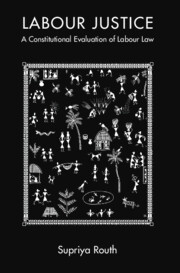Book contents
- Frontmatter
- Dedication
- Contents
- Preface
- Acknowledgements
- Introduction: The Law of Labour—Evaluating the Labour Law Reforms
- 1 Labour’s Constitution: Pursuing Economic, Social and Political Justice
- 2 Individual Autonomy, Freedom of Contract and the Labour Market
- 3 Solidarity and Social Welfar
- 4 Industrial Democracy and Republican Citizenship: Collective Action in Resource Redistribution
- Conclusion: Realising Labour Justice
- Bibliography
- Index
1 - Labour’s Constitution: Pursuing Economic, Social and Political Justice
Published online by Cambridge University Press: 30 April 2024
- Frontmatter
- Dedication
- Contents
- Preface
- Acknowledgements
- Introduction: The Law of Labour—Evaluating the Labour Law Reforms
- 1 Labour’s Constitution: Pursuing Economic, Social and Political Justice
- 2 Individual Autonomy, Freedom of Contract and the Labour Market
- 3 Solidarity and Social Welfar
- 4 Industrial Democracy and Republican Citizenship: Collective Action in Resource Redistribution
- Conclusion: Realising Labour Justice
- Bibliography
- Index
Summary
Introduction
One of the core normative aims of the Indian Constitution is the creation of an active citizenry. An Indian citizen is duty-bound to respect the constitutional principles, follow the ideals that guided the Indian independence movement, protect the sovereignty and unity of the country, defend the country, promote harmony and brotherhood, preserve the nation's heritage and culture, protect and improve the natural environment, develop scientific temper and inquisitiveness, safeguard public property, provide opportunities for their children's education and strive towards excellence in all spheres of individual and collective activities. It is by imagining Indian citizens as agents of historical continuation and progressive change through their individual and collective activities that the slave mentality of the Indian subjects under the British rule could be overcome. While it is true that the Constitution aimed to create independent political agents capable of self-determination, the ideal of enterprising citizens, or worker-citizens, is also required to overcome the slave mentality and simultaneously pursue a nation-building agenda. In fact, the Constitution's three major trajectories – that of securing political freedoms, planning economic development and undertaking social reform – all take the idea of worker-citizens as the core of their agenda. Although different dimensions of Indian citizenship may be contested, the secular Indian identity is so intimately connected to the idea of the worker-citizen that it is around this ideal that the Constitution develops its social justice narrative. Yet this aspect of the Constitution has rarely received a sustained analysis from constitutional law scholars, including by those offering a tour d’horizon of the Constitution.
Since the Constitution signifies a break from the past, Indian citizens are conceived as agents of change. Work, or labour, is the primary process through which this agency finds – ought to find – a concrete personal expression in accordance with the Constitutional plan. The de facto reach of the concept of work, and consequently of the worker identity, is much more pervasive than that of the fundamental duty-bearing political citizen. Work is a fundamental condition of life for the overwhelming majority of Indian citizens. If we take into account an expansive definition of work as also including unpaid and care work, the magnitude of the worker identity becomes staggering.
- Type
- Chapter
- Information
- Labour JusticeA Constitutional Evaluation of Labour Law, pp. 29 - 67Publisher: Cambridge University PressPrint publication year: 2024

